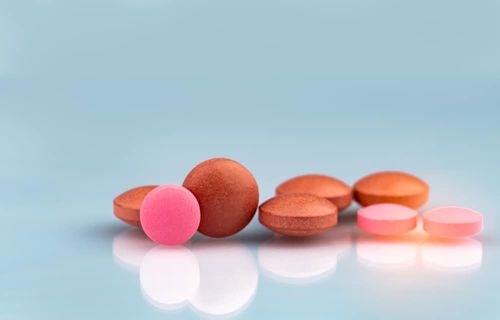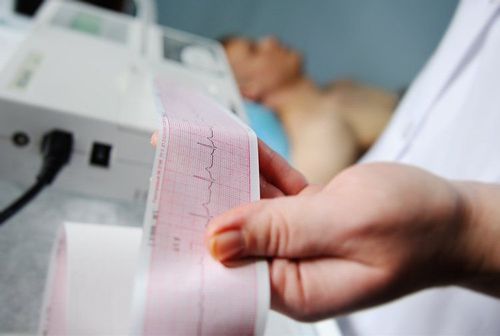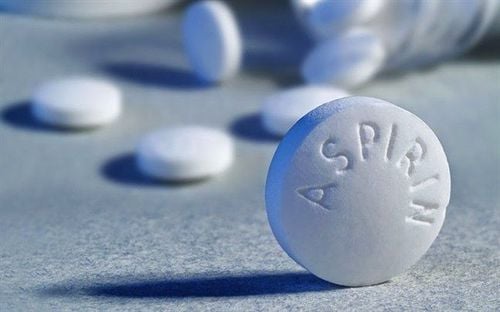This is an automatically translated article.
Myocardial infarction is usually caused by the formation of a blood clot in the blood vessel, causing many serious consequences such as cardiac arrest leading to death. So how can a heart attack be treated? What medications are available to treat a heart attack?
1. What is a myocardial infarction?
Myocardial infarction is a necrosis of an area of the myocardium due to prolonged myocardial ischemia. It is usually caused by the formation of blood clots (thrombosis) in the lumen of a coronary artery, causing blockage and necrosis of the area of heart muscle that the coronary artery is feeding.
There are many measures that can be applied in the treatment of myocardial infarction. However, no matter what measures are applied, it is indispensable for the group of drugs to treat myocardial infarction.
Chest pain is considered the most obvious warning symptom, chest pain usually occurs in the middle of the sternum and can last a few minutes. The pain may come, go, and reappear. The pain can be described as something pressing on the chest, like a stabbing knife, or feeling suffocated. In addition, the pain can appear in other locations such as on the neck, back, under the stomach or on the jaw. Some other symptoms may accompany such as vomiting, cold sweat, mild headache. It is recommended that patients should go to the hospital as soon as possible when having chest pain as above for timely support.
Myocardial infarction often occurs in subjects:
People with high risk of myocardial infarction are men > 45 years old and women > 50 years old. It can also be seen in a small percentage in young adults. People with a history of myocardial infarction are very likely to have a recurrence. Myocardial infarction has a family history such as a father or brother having a heart attack when < 55 years old and a mother or sister having a heart attack when < 65 years old. Diabetes may pose a similar risk for myocardial infarction in patients with a history of myocardial infarction. There are also people with other high risk factors such as: high blood pressure, dyslipidemia, obesity, smoking, physical inactivity.
2. Groups of drugs to treat myocardial infarction
2.1. Antiplatelet agents Antiplatelet agents such as aspirin, ticlopidine, ticagrelor, clopidogrel, and glycoprotein (GP) IIb/IIIa inhibitors. In the absence of contraindications to the loading dose, all patients were prescribed aspirin at 160 to 325 mg (non-enteric coated and 81 mg once daily for long-term thereafter.
For the first dose, the patient needs to chew before swallowing for rapid absorption. Aspirin has been shown to improve the risk of short and long-term mortality. If the patient is unable to take Aspirin, it may be an alternative. Clopidogrel 75 mg orally once a day or use Ticlopidine at a dose of 250 mg / 2 times / day.Ticlodine during use can cause a risk of neutropenia and often requires monitoring of leukocyte counts. Clopidogrel has been used routinely to replace most of Ticlodine.
2.2 Drugs that inhibit platelet glycoprotein IIb/IIIa receptors Drugs that inhibit platelet glycoprotein IIb/IIIa receptors such as eptifibatide, abciximab, tirofibran... is effective in inhibiting platelet aggregation, so this class of drugs is ideal for the treatment of acute myocardial infarction. The disadvantage of this drug is its high cost.
2.3. Heparin anticoagulants are commonly used to prevent the spread of blood clots in the clinical setting. Accordingly, it can help prevent the appearance of new thrombus, thrombosis in the great circulation and help prevent re-occlusion of the coronary arteries. Due to its inhibitory effect on fibrin stabilizing factors, heparin also helps prevent stable thrombus formation. The overdose of Heparin can cause bleeding complications, so in the process of using the drug, the patient needs to be adjusted to the appropriate dose and closely monitored the coagulation index.
Low Molecular Weight Heparin: Low molecular weight heparin has a similar effect to regular heparin, but has the advantage of not requiring close monitoring and frequent evaluation of anticoagulant effects. . Therefore, the use of this drug becomes simpler and gives a longer lasting effect. This group of drugs is less likely to cause thrombocytopenia than regular heparin. Commonly used drugs are Fraxiparin, Levenox.
2.4. The main effect of nitrate drugs is to cause peripheral vasodilatation, which leads to a decrease in cardiac blood volume combined with dilation of arterioles leading to a decrease in peripheral resistance and thereby reducing myocardial oxygen consumption.
The drug also has the effect of dilating coronary arteries, so it prevents spasm in the coronary arteries. When areas of the heart muscle are ischemic, the drug also works to increase collateral circulation to those areas. When a patient has a heart attack, as soon as angina occurs, it is necessary to immediately use a fast-acting medicine such as sublingual or sublingual spray (lenitral spray, natispray). Then, if the symptoms do not improve, take the patient to the hospital, at the hospital the patient will be given Nitroglycerin (such as Lenitral 10 ml containing 15 mg of Nitroglycerin) intravenously with a low starting dose and can Adjusted incrementally according to individual patient response. There are also slow-acting oral medications such as Nitromint, Lenitral.
Drugs in this group can cause common unwanted effects such as: dizziness, headache, hypotension, hot flashes, tachycardia... Therefore, during use, caution should be exercised. in patients taking concomitant antihypertensive drugs.
2.5. Drugs in the group of beta-blockers of sympathomimetic receptors The drugs in this group have competitive antagonism with sympathomimetics, thereby helping to reduce myocardial contractility, lower heart rate, and help reduce oxygen consumption of the heart. myocardium and contribute to reducing the spread of myocardial necrosis. It can also help reduce and prevent complications caused by ventricular arrhythmias. The use of this drug is contraindicated in the following cases: hypotension, bradycardia, bronchial asthma, high degree of atrioventricular block, cardiogenic shock and heart failure.
The most commonly used cardioselective beta-blockers are: metoprolol, atenolol, bisoprolol.
2.6. Medications to correct dyslipidemia The main cause of myocardial infarction is atherosclerosis. Machine cholesterol plays an important role in the formation and progression of atherosclerotic plaques. Therefore, in the treatment regimen of myocardial infarction, it is indispensable to correct dyslipidemia. Drugs in this class are effective not only in reducing cardiovascular events in patients with dyslipidemia, but also in patients without these disorders.
Statins group is a group of drugs commonly used after myocardial infarction today, such as simvastatin, rosuvastatin, atorvastatin.
2.7. Calcium channel blockers (inhibitors) The drugs of this group are divided into 2 groups with different contraindications in each group. Non Dihydropiridin group (must strictly respect the contraindications of this group of drugs due to the effect of slowing the heart rate and causing a decrease in heart contractility) and Dihydropiridin.
2.8. ACE inhibitors In patients after myocardial infarction, drugs of this class are not only effective in lowering blood pressure, but also in combating left ventricular dysfunction and internal function. vascular tissue in these patients, helping to reduce the events of heart failure, recurrent myocardial infarction.
Drugs are usually prescribed as soon as the patient has a myocardial infarction. Cough is the most common adverse effect of this class of drugs. The commonly used drugs are: enalapril, perindopril, tanatrile, lisinopril, ... Start using the drug at a low dose and gradually increase the dose in accordance with the response of each patient.
2.9. Thrombolytics (thrombolytics) Drugs in this class have a therapeutic effect because they recirculate the coronary arteries, remove the mechanical obstruction, and help return blood to the heart muscle. previously anemic. Thrombolytics should be administered as soon as possible to achieve optimal therapeutic effect (if the duration of myocardial infarction exceeds 12 hours, fibrinolytics are not required).
Please dial HOTLINE for more information or register for an appointment HERE. Download MyVinmec app to make appointments faster and to manage your bookings easily.













